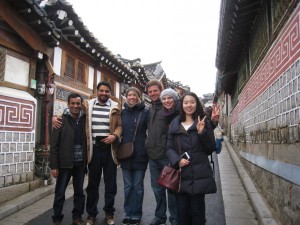
Nathan Taylor, 2013-2014, South Korea (third from right), with his lab coworkers, visiting scholars from Germany in Bukchon Hanok Village in Seoul, South Korea
Prior to my experience as a Fulbright Student, I had almost no connection to South Korea. Before my Fulbright grant, I had been working on my Ph.D. at Drexel University in Philadelphia for the last five years and had never lived outside of my home state of Pennsylvania for any appreciable amount of time. The only tie that I had to South Korea was my research interests and a passion for learning about different cultures. I was introduced the Plasma Bioscience Research Center (PBRC) at Kwangwoon University by my research adviser at Drexel, so I advise any potential applicants to reach out to their advisors for connections as well. After receiving the fellowship, I spent 10 months living and working in Seoul, South Korea.
The people I met in South Korea were some of the most hospitable people that I have ever had the privilege of knowing. From my very first day, I was treated better than I could have imagined. The day that I landed, I was taken from the airport to my house and minutes later (after a 23 hour trip without a shower), went to a dinner with all of the lab members I would be working with and a visiting lab team from Japan. It was quite jarring, but they wanted to make sure that I was introduced as soon as possible and included in the event that was happening.
I did not know it at the time, but this kind of affair was very common. Almost every week the entire lab would go out to dinner together and visitors from around the world would often come to Kwangwoon to present and collaborate. Professor Choi, the head of PBRC, believes very highly in collaboration and spending time together inside and outside of the lab. Thanks to him, I built a strong relationship with my coworkers and met many interesting people. I learned that this interest in involvement outside of work is very common in the Korean working environment and people have varying opinions on it.
My research project was to explore the effects of electric plasma on the normal and cancerous skin cells. Before going to South Korea, I had never done any work with living cells since I was a mechanical engineer. The professors and students worked closely with me and teach me the methods that they used to treat the cells and quantify the results. I learned a lot about the methods and was able to share my knowledge related to engineering since they were mostly physicists and biologists.
I believe that the collaboration between PBRC and myself improved the mutual understanding of our research efforts and our cultures. The friendships that I built with my coworkers and others may have been one of the most important benefits of my Fulbright grant because I now have a strong understanding of not just Korean people, but also many other international students also studying at Kwangwoon. It is likely that the relationships that I built will continue for the foreseeable future and create even more successful collaborations.

No Comments